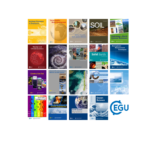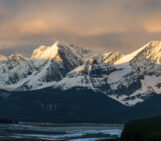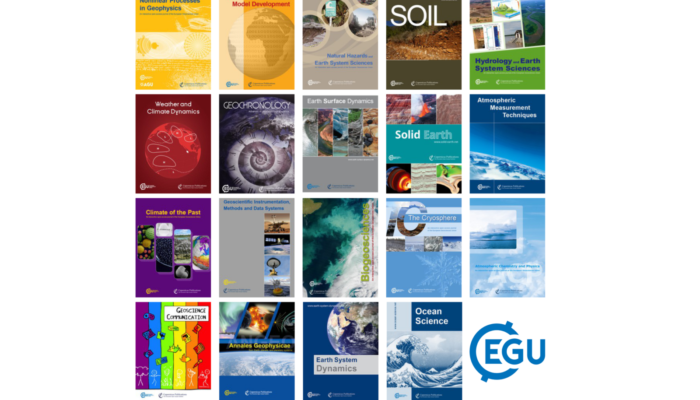
Each month we feature specific Divisions of EGU and during the monthly GeoRoundup we put the journals that publish science from those Divisions at the top of the Highlights roundup. For December, the Divisions we are featuring are: Cryosphere (CR), Nonlinear Processes in Geoscience (NP) and Soil System Science (SSS). They are served by the journals: Biogeosciences (BG), Earth Surface Dynamics (ESurf), Geoscientific Instrumentation, Methods and Data Systems (GI), Geoscientific Model Development (GMD), Hydrology and Earth System Sciences (HESS), Natural Hazards and Earth System Sciences (NHESS), Nonlinear Processes in Geophysics (NPG), Solid Earth (SE), SOIL, The Cryosphere (TC) and Weather and Climate Dynamics (WCD).
Featured highlights
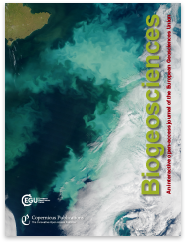 Contrasting drought legacy effects on gross primary productivity in a mixed versus pure beech forest – 2 December 2022
Contrasting drought legacy effects on gross primary productivity in a mixed versus pure beech forest – 2 December 2022
Identifying drought legacy effects is challenging because they are superimposed on variability driven by climate conditions in the recovery period. We develop a residual-based approach to quantify legacies on gross primary productivity (GPP) from eddy covariance data. The GPP reduction due to legacy effects is comparable to the concurrent effects at two sites in Germany, which reveals the importance of legacy effects. Our novel methodology can be used to quantify drought legacies elsewhere.
Observation-constrained estimates of the global ocean carbon sink from Earth system models – 9 December 2022
Estimates of the ocean sink of anthropogenic carbon vary across various approaches. We show that the global ocean carbon sink can be estimated by three parameters, two of which approximate the ocean ventilation in the Southern Ocean and the North Atlantic, and one of which approximates the chemical capacity of the ocean to take up carbon. With observations of these parameters, we estimate that the global ocean carbon sink is 10% larger than previously assumed, and we cut uncertainties in half.
Natural Hazards and Earth System Sciences:
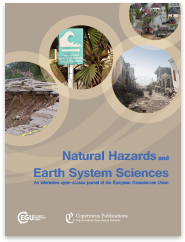 Progress and challenges in glacial lake outburst flood research (2017–2021): a research community perspective – 12 December 2022
Progress and challenges in glacial lake outburst flood research (2017–2021): a research community perspective – 12 December 2022
Glacial lake outburst floods (GLOFs) have attracted increased research attention recently. In this work, we review GLOF research papers published between 2017 and 2021 and complement the analysis with research community insights gained from the 2021 GLOF conference we organized. The transdisciplinary character of the conference together with broad geographical coverage allowed us to identify progress, trends and challenges in GLOF research and outline future research needs and directions.
Other highlights
Atmospheric Chemistry and Physics:
Cloud adjustments from large-scale smoke–circulation interactions strongly modulate the southeastern Atlantic stratocumulus-to-cumulus transition – 14 December 2022
Shallow marine carbonates as recorders of orbitally induced past climate changes – example from the Oxfordian of the Swiss Jura Mountains – 5 December 2022
Hydrography, circulation, and response to atmospheric forcing in the vicinity of the central Getz Ice Shelf, Amundsen Sea, Antarctica – 7 December 2022
EGU science in the news – December 2022
- Complete picture of Arctic sea ice freeze-thaw cycle highlights sea ice response to climate change (Science Daily and Earth.com) reports on an EGU press release
- Natural hazards and earthquake science: Gender matters (Frontiers), cites the EGU as an example of a key scientific society with an EDI group
- Travel drop aided lockdown methane surge, study finds (University of Reading), based on a study published in the EGU journal Atmospheric Chemistry and Physics
- Individual tree-based model constructed for multiscale forest carbon dynamics prediction (Phys.org), based on a study published in the EGU journal Geoscientific Model Development
- New visualization tool to identify and study bands of heavy snow (Tech Explorist), based on a study published in the EGU journal Atmospheric Measurement Techniques
- Upcoming Galileo Conference to Focus on Geohazards in the Exascale Era (HPC Wire), highlights the upcoming Galileo Conference supported by EGU
- EGU announces its 2023 awards and medals (Past Global Changes.org), highlights EGU’s awards and medals news announcement
- (The Harvard Gazette) mentions EGU’s Arthur Holmes Medal (Water World Magazine), based on a study published in the EGU journal Geoscientific Model Development

